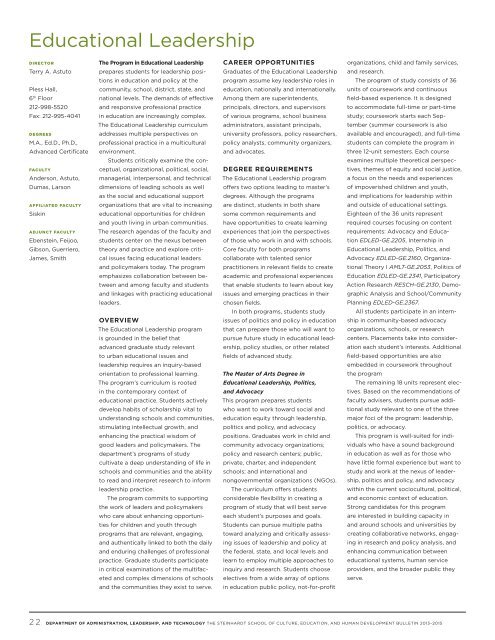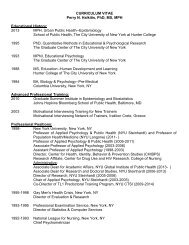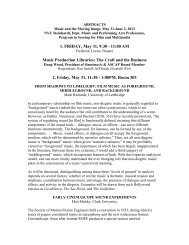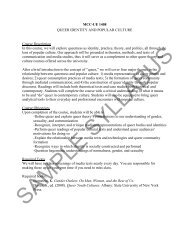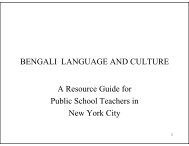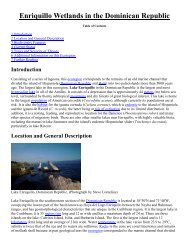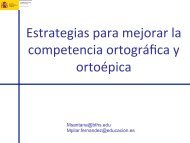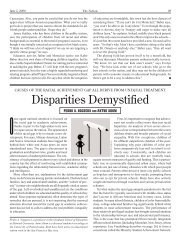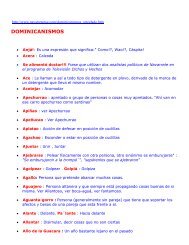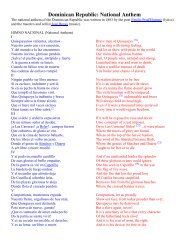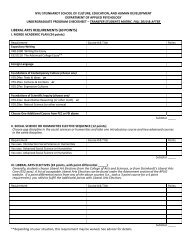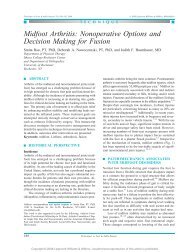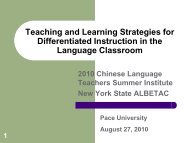applied psychology art education health media ... - NYU Steinhardt
applied psychology art education health media ... - NYU Steinhardt
applied psychology art education health media ... - NYU Steinhardt
Create successful ePaper yourself
Turn your PDF publications into a flip-book with our unique Google optimized e-Paper software.
Educational Leadership<br />
Director<br />
Terry A. Astuto<br />
Pless Hall,<br />
6 th Floor<br />
212-998-5520<br />
Fax: 212-995-4041<br />
Degrees<br />
M.A., Ed.D., Ph.D.,<br />
Advanced Certificate<br />
Faculty<br />
Anderson, Astuto,<br />
Dumas, Larson<br />
Affiliated Faculty<br />
Siskin<br />
Adjunct Faculty<br />
Ebenstein, Feijoo,<br />
Gibson, Guerriero,<br />
James, Smith<br />
The Program in Educational Leadership<br />
prepares students for leadership positions<br />
in <strong>education</strong> and policy at the<br />
community, school, district, state, and<br />
national levels. The demands of effective<br />
and responsive professional practice<br />
in <strong>education</strong> are increasingly complex.<br />
The Educational Leadership curriculum<br />
addresses multiple perspectives on<br />
professional practice in a multicultural<br />
environment.<br />
Students critically examine the conceptual,<br />
organizational, political, social,<br />
managerial, interpersonal, and technical<br />
dimensions of leading schools as well<br />
as the social and <strong>education</strong>al support<br />
organizations that are vital to increasing<br />
<strong>education</strong>al opportunities for children<br />
and youth living in urban communities.<br />
The research agendas of the faculty and<br />
students center on the nexus between<br />
theory and practice and explore critical<br />
issues facing <strong>education</strong>al leaders<br />
and policymakers today. The program<br />
emphasizes collaboration between between<br />
and among faculty and students<br />
and linkages with practicing <strong>education</strong>al<br />
leaders.<br />
OVERVIEW<br />
The Educational Leadership program<br />
is grounded in the belief that<br />
advanced graduate study relevant<br />
to urban <strong>education</strong>al issues and<br />
leadership requires an inquiry-based<br />
orientation to professional learning.<br />
The program’s curriculum is rooted<br />
in the contemporary context of<br />
<strong>education</strong>al practice. Students actively<br />
develop habits of scholarship vital to<br />
understanding schools and communities,<br />
stimulating intellectual growth, and<br />
enhancing the practical wisdom of<br />
good leaders and policymakers. The<br />
dep<strong>art</strong>ment’s programs of study<br />
cultivate a deep understanding of life in<br />
schools and communities and the ability<br />
to read and interpret research to inform<br />
leadership practice.<br />
The program commits to supporting<br />
the work of leaders and policymakers<br />
who care about enhancing opportunities<br />
for children and youth through<br />
programs that are relevant, engaging,<br />
and authentically linked to both the daily<br />
and enduring challenges of professional<br />
practice. Graduate students p<strong>art</strong>icipate<br />
in critical examinations of the multifaceted<br />
and complex dimensions of schools<br />
and the communities they exist to serve.<br />
CAREER OPPORTUNITIES<br />
Graduates of the Educational Leadership<br />
program assume key leadership roles in<br />
<strong>education</strong>, nationally and internationally.<br />
Among them are superintendents,<br />
principals, directors, and supervisors<br />
of various programs, school business<br />
administrators, assistant principals,<br />
university professors, policy researchers,<br />
policy analysts, community organizers,<br />
and advocates.<br />
DEGREE REQUIREMENTS<br />
The Educational Leadership program<br />
offers two options leading to master’s<br />
degrees. Although the programs<br />
are distinct, students in both share<br />
some common requirements and<br />
have opportunities to create learning<br />
experiences that join the perspectives<br />
of those who work in and with schools.<br />
Core faculty for both programs<br />
collaborate with talented senior<br />
practitioners in relevant fields to create<br />
academic and professional experiences<br />
that enable students to learn about key<br />
issues and emerging practices in their<br />
chosen fields.<br />
In both programs, students study<br />
issues of politics and policy in <strong>education</strong><br />
that can prepare those who will want to<br />
pursue future study in <strong>education</strong>al leadership,<br />
policy studies, or other related<br />
fields of advanced study.<br />
The Master of Arts Degree in<br />
Educational Leadership, Politics,<br />
and Advocacy<br />
This program prepares students<br />
who want to work toward social and<br />
<strong>education</strong> equity through leadership,<br />
politics and policy, and advocacy<br />
positions. Graduates work in child and<br />
community advocacy organizations;<br />
policy and research centers; public,<br />
private, ch<strong>art</strong>er, and independent<br />
schools; and international and<br />
nongovernmental organizations (NGOs).<br />
The curriculum offers students<br />
considerable flexibility in creating a<br />
program of study that will best serve<br />
each student’s purposes and goals.<br />
Students can pursue multiple paths<br />
toward analyzing and critically assessing<br />
issues of leadership and policy at<br />
the federal, state, and local levels and<br />
learn to employ multiple approaches to<br />
inquiry and research. Students choose<br />
electives from a wide array of options<br />
in <strong>education</strong> public policy, not-for-profit<br />
organizations, child and family services,<br />
and research.<br />
The program of study consists of 36<br />
units of coursework and continuous<br />
field-based experience. It is designed<br />
to accommodate full-time or p<strong>art</strong>-time<br />
study; coursework st<strong>art</strong>s each September<br />
(summer coursework is also<br />
available and encouraged), and full-time<br />
students can complete the program in<br />
three 12-unit semesters. Each course<br />
examines multiple theoretical perspectives,<br />
themes of equity and social justice,<br />
a focus on the needs and experiences<br />
of impoverished children and youth,<br />
and implications for leadership within<br />
and outside of <strong>education</strong>al settings.<br />
Eighteen of the 36 units represent<br />
required courses focusing on content<br />
requirements: Advocacy and Education<br />
EDLED-GE.2205, Internship in<br />
Educational Leadership, Politics, and<br />
Advocacy EDLED-GE.2160, Organizational<br />
Theory I AMLT-GE.2053, Politics of<br />
Education EDLED-GE.2341, P<strong>art</strong>icipatory<br />
Action Research RESCH-GE.2130, Demographic<br />
Analysis and School/Community<br />
Planning EDLED-GE.2367.<br />
All students p<strong>art</strong>icipate in an internship<br />
in community-based advocacy<br />
organizations, schools, or research<br />
centers. Placements take into consideration<br />
each student’s interests. Additional<br />
field-based opportunities are also<br />
embedded in coursework throughout<br />
the program<br />
The remaining 18 units represent electives.<br />
Based on the recommendations of<br />
faculty advisers, students pursue additional<br />
study relevant to one of the three<br />
major foci of the program: leadership,<br />
politics, or advocacy.<br />
This program is well-suited for individuals<br />
who have a sound background<br />
in <strong>education</strong> as well as for those who<br />
have little formal experience but want to<br />
study and work at the nexus of leadership,<br />
politics and policy, and advocacy<br />
within the current sociocultural, political,<br />
and economic context of <strong>education</strong>.<br />
Strong candidates for this program<br />
are interested in building capacity in<br />
and around schools and universities by<br />
creating collaborative networks, engaging<br />
in research and policy analysis, and<br />
enhancing communication between<br />
<strong>education</strong>al systems, human service<br />
providers, and the broader public they<br />
serve.<br />
22 Dep<strong>art</strong>ment of administration, leadership, and technology the steinhardt school of culture, <strong>education</strong>, and human development bulletin 2013–2015


